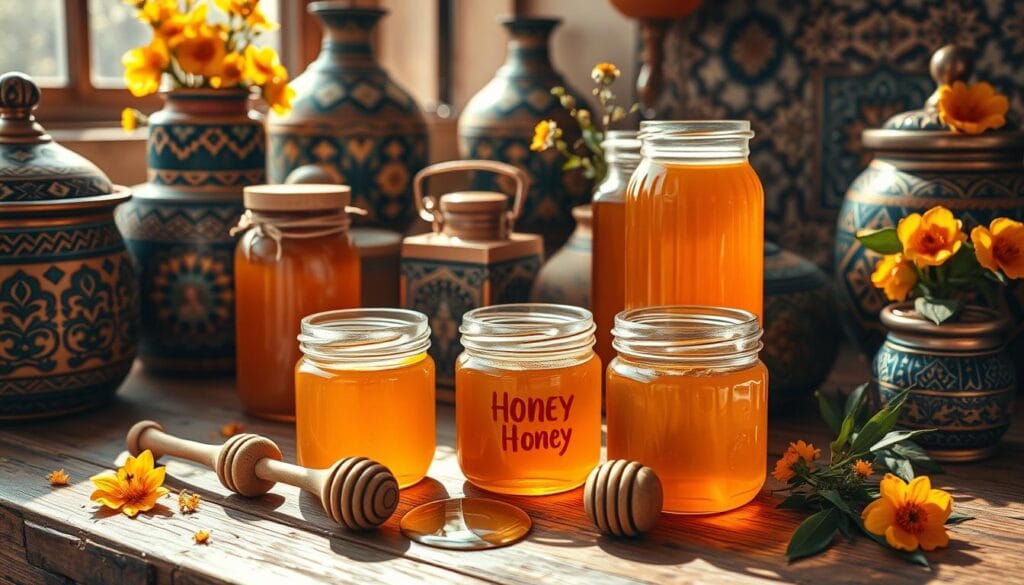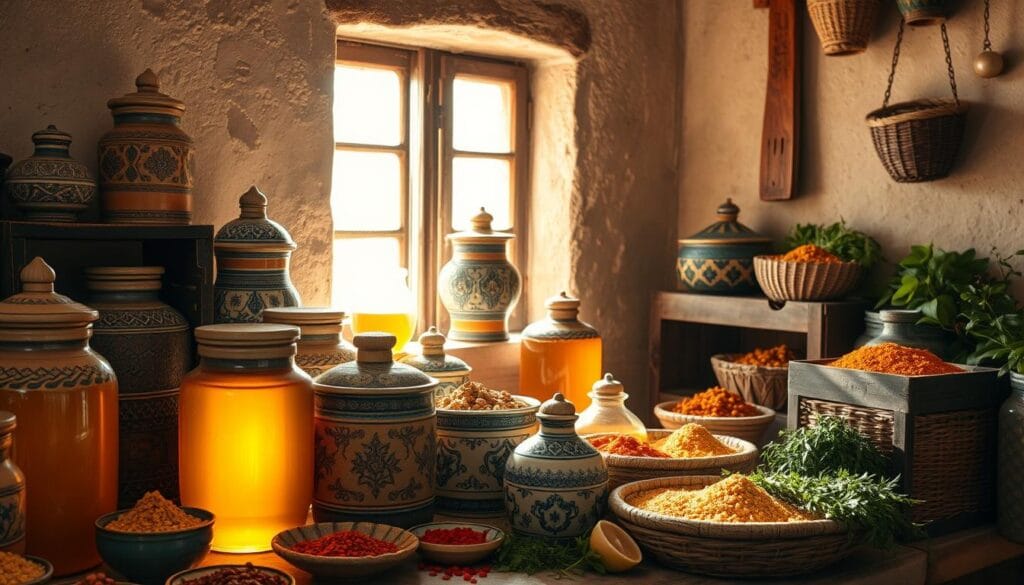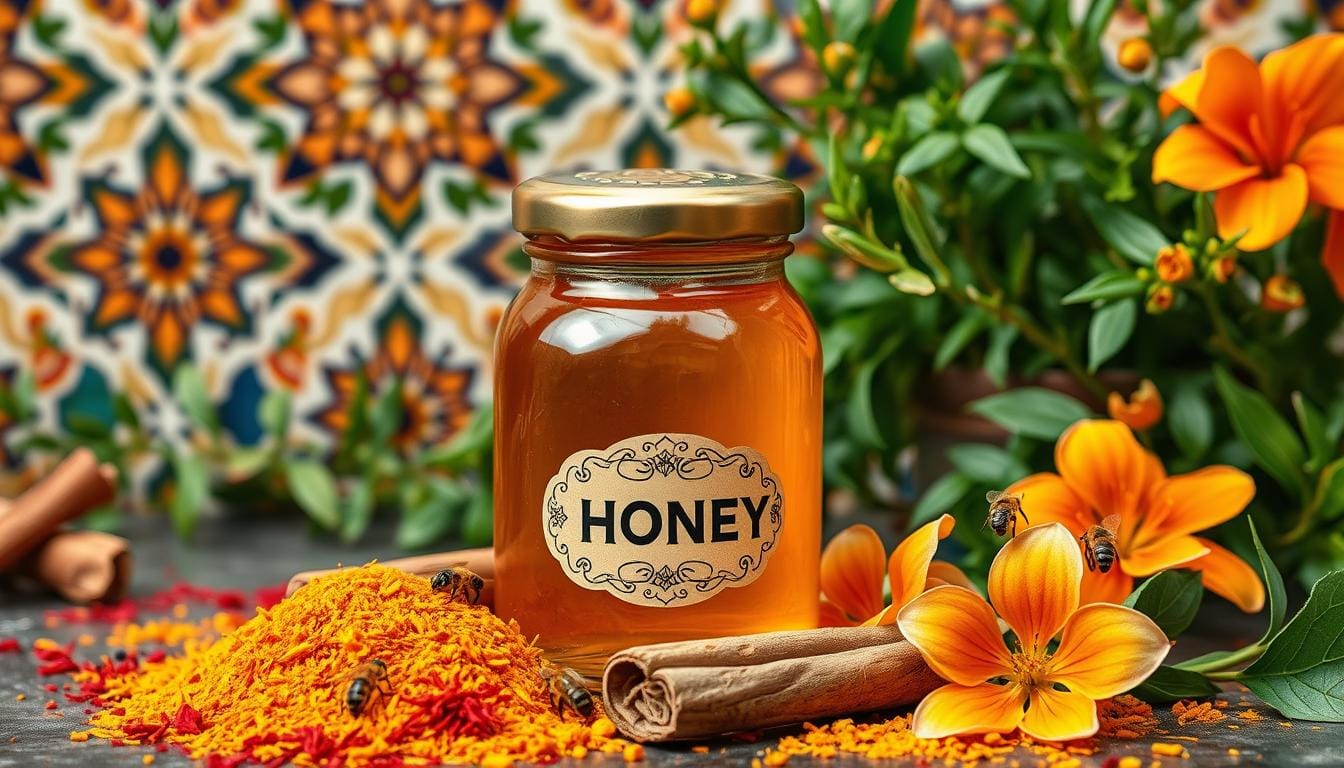Savor the Rich and Unique Flavors of Moroccan Honey: Your Complete Guide
Table of Contents
Ever wondered why Moroccan honey is so unique? It’s known for its rich flavors and health benefits. This makes it a top pick for those looking for a natural sweetener.
But what makes Moroccan honey stand out? And how can you use it in your daily life? Let’s find out.
Key Takeaways
- Moroccan honey is a natural sweetener with unique flavors and aromas.
- Pure moroccan honey offers numerous health benefits and is a popular choice for those seeking a natural sweetener.
- Honey can be used in a variety of ways, from cooking and baking to as a natural remedy.
- When shopping for honey, look for high-quality, pure moroccan honey to ensure you get the best flavor and nutritional benefits.
- Incorporating honey into your daily life can be easy and delicious, with many recipes and uses available.
What Makes Moroccan Honey Special
Moroccan honey, like organic and raw honey, is famous for its unique tastes and quality. The country’s diverse nature and old beekeeping ways make its honey special. Exploring Moroccan honey shows how place and culture shape its making.
The Souss-Massa area is key for honey in Morocco. Its bees gather nectar from thyme, eucalyptus, and carob trees. This gives honey like thyme, euphorbia, and orange blossom their unique tastes and health perks.
Traditional Beekeeping Methods
Old beekeeping ways in Souss-Massa keep Moroccan honey top-notch. Beekeepers use methods passed down for generations. This ensures the honey stays natural and flavorful.
Geographic Influence on Honey Production
Morocco’s varied landscapes and climate shape its honey. The country’s geography and climate are perfect for beekeeping. This leads to many honey types, from the Atlas Mountains to the Sahara.
Cultural Significance in Morocco
Honey is deeply valued in Moroccan culture. The Honey Festival celebrates beekeeping traditions. It’s a big event in Ida-Outanane, showing honey’s role in Moroccan life.
The Rich History of Honey Production in Morocco
Exploring authentic moroccan honey reveals a long history. Beekeeping in Morocco is an ancient tradition. The country’s unique geography and climate have shaped its beekeeping practices, leading to high-quality honey products.
The history of honey in Morocco is rich and long. Beekeeping here dates back thousands of years. Morocco’s location at the crossroads of Europe, Africa, and the Middle East made it a key spot for trade and cultural exchange. Authentic honey was highly valued.
Some key facts about honey production in Morocco include:
- Honey has been used for healing and as food for bees and humans for centuries.
- Its antibacterial properties were recognized in 1892 by Dutch Scientist Van Ketel, who found it could sterilize wounds.
- Honey is effective in treating burns, skin ulcers, and other lesions in both humans and animals.
In Morocco, honey products are a big industry. Many beekeepers use traditional methods to make their honey. The country’s climate and geography allow for a variety of honey types, each with its own flavor and characteristics.
Learning about Morocco’s honey history deepens your appreciation for the craftsmanship and tradition behind these delicious and nutritious honey products.
Types of Pure Moroccan Honey
Morocco is famous for its wide variety of premium honey flavors. Pure Moroccan honey is loved for its unique taste and health perks. Thyme honey, in particular, is highly valued for its quality and healing properties.
Here are some key types of pure Moroccan honey:
- Thyme honey, known for its health benefits and sweet aroma
- Carob honey, celebrated for its unique taste and health advantages
- Euphorbia honey, famous for soothing respiratory problems
- Orange blossom honey, cherished for its light flavor and scent
These types of honey are not just tasty but also good for your health. They’re a favorite among those looking for natural remedies or special ingredients for cooking. Pure Moroccan honey is a great choice for anyone.
Nutritional Benefits of Authentic Moroccan Honey
Honey is a natural sweetener packed with antioxidants, vitamins, and minerals. It’s a healthier choice than refined sugars. You can use it as a topping for breakfast or in cooking and baking.
Some key benefits of honey include:
- High antioxidant content, which helps to combat free radicals and oxidative stress
- Rich in vitamins and minerals, such as vitamin C and calcium
- Contains antibacterial and anti-inflammatory properties, making it suitable for topical application on minor burns and wounds
Choosing a natural sweetener like organic honey and raw honey is wise. Honey adds unique flavor and health benefits to your diet.
To keep honey nutritious, store it right. Keep it in a cool, dark place, away from heat and moisture. This way, you can enjoy its benefits for longer.
| Type of Honey | Nutritional Benefits |
|---|---|
| Sidr Honey | Rich in antioxidants, flavonoids, and vitamin C |
| Jujube Honey | Known for its therapeutic virtues and used to treat various health issues |
Traditional Harvesting Techniques
Producing top-notch honey from morocco relies on old-school harvesting methods. The Inzerki apiary is a top name in honey making. Here, beekeepers work hard to create authentic moroccan honey.
Harvesting premium honey needs a lot of planning and focus. Beekeepers watch the seasons closely. They pick the best time to get the honey, keeping its taste and health benefits just right.
Seasonal Harvesting Patterns
Seasonal harvesting is key for the bees and the planet. It helps keep the ecosystem in balance. This way, beekeepers make sure the honey from morocco is of the highest quality.
Sustainable Practices
Using sustainable methods, like seasonal harvesting, is important for authentic honey. These practices protect the environment and keep the beekeeping business alive.
By sticking to sustainable and traditional methods, beekeepers make premium honey. This honey is tasty and good for the planet.
| Type of Honey | Harvesting Season | Unique Characteristics |
|---|---|---|
| Thyme Honey | Summer | Distinctive flavor and aroma |
| Carob Honey | Autumn | Rich, sweet flavor |
| Euphorbia Honey | Spring | Light, floral flavor |
How to Identify Premium Moroccan Honey
Identifying premium Moroccan honey involves several key factors. As you explore pure honey, look for unique characteristics. With up to 76% of honey in American supermarkets possibly being fake, knowing what to look for is critical.
High-quality Moroccan honey has a rich, dark color and thick consistency. Its taste should be complex, with hints of spices and herbs. Always check for certifications from trusted organizations to ensure authenticity.

Color and Consistency Guidelines
When checking the color and consistency of Moroccan honey, keep these guidelines in mind:
- Color: Dark amber to brown
- Consistency: Thick and viscous
- Texture: Smooth and even
Taste Profile Analysis
The taste of premium honey is a key identifier. It should have a complex flavor with notes of:
- Spices: Cinnamon, ginger, and cloves
- Herbs: Thyme, rosemary, and eucalyptus
- Fruits: Orange blossom and lemon
Authentication Markers
To confirm the authenticity of your honey, look for these markers:
- Certifications from reputable organizations
- Clear labeling and packaging
- Transparent information about origin and production
Culinary Applications of Moroccan Honey
Moroccan cuisine celebrates diversity and tradition, often using honey in dishes. Authentic Moroccan honey is a natural sweetener for many recipes. It adds sweetness to both savory and sweet dishes, making them more enjoyable.
Traditional Moroccan dishes like tagines and couscous often include honey. These dishes combine meats, vegetables, and spices, cooked in clay pots. Honey’s unique flavor and aroma make these dishes special. It’s also a healthier sugar substitute in cooking.
Honey is not just for traditional dishes. It’s great for glazing meats or vegetables, or as a yogurt or oatmeal topping. Its endless uses can bring new flavors and excitement to your meals. Moroccan honey’s unique taste and health benefits make it a valuable addition to any kitchen.
Some popular recipes that use authentic Moroccan honey include:
- Tagine with honey and almonds
- Couscous with honey and spices
- Honey and orange blossom water cake
These recipes highlight honey’s versatility and ability to enhance flavors. Whether you want to sweeten your meals or try new flavors, honey is a great choice.
Therapeutic Uses in Traditional Medicine
Honey has been a key part of traditional medicine for centuries. It helps promote health and well-being. Raw honey is great for soothing respiratory issues. Organic honey, on the other hand, is known for its antibacterial properties.
Some honeys, like thyme and euphorbia, are famous for their soothing effects. They help ease respiratory issues, asthma, and heart conditions. These honeys are perfect for making natural remedies, a great alternative to traditional medicine.
In traditional medicine, bee products like honey, bee venom, and royal jelly are used to treat many ailments. Bee venom contains peptides with therapeutic properties. Royal jelly has compounds that offer antibacterial, anti-inflammatory, and anti-aging benefits.
Ancient Healing Practices
Ancient healing practices often used natural products like honey. It was valued for its medicinal properties. Raw honey is great for making natural remedies, while organic honey soothes respiratory issues.
Modern Applications
In modern times, honey is used to treat various health conditions. It has antiviral and antibacterial properties. This makes it effective against viruses like herpesviruses, influenza virus, and SARS-CoV-2.
The following table summarizes some of the therapeutic uses of moroccan honey:
| Type of Honey | Therapeutic Use |
|---|---|
| Thyme Honey | Soothing respiratory issues, easing asthma and heart conditions |
| Euphorbia Honey | Easing respiratory issues, soothing asthma and heart conditions |
| Raw Honey | Creating natural remedies, soothing respiratory issues |
| Organic Honey | Antibacterial properties, soothing respiratory issues |
Storage and Preservation Tips
To keep premium honey fresh and quality, proper storage is key. Temperature, humidity, and light affect how well authentic moroccan honey stays fresh.
Here are some tips for storing and preserving honey products:
- Store honey in a cool, dry place, away from direct sunlight and heat sources.
- Maintain a consistent temperature between 10°C and 20°C to prevent fermentation and crystallization.
- Use glass or stainless steel containers, as they are non-reactive and won’t absorb or release chemicals into the honey.
- Avoid storing honey in plastic containers, as they can release chemicals and affect the honey’s quality.
By following these tips, you can enjoy your authentic honey for longer. It will keep its natural flavor and nutrients.

| Storage Conditions | Effects on Honey |
|---|---|
| Temperature: 10°C – 20°C | Preserves natural properties, prevents fermentation |
| Humidity: below 18% | Prevents moisture absorption, maintains quality |
| Light exposure: minimal | Preserves aromatic compounds, prevents degradation |
Remember, proper storage and preservation are key to keeping premium honey and honey products fresh. Follow these tips to enjoy your authentic honey for longer, keeping its natural taste and nutrients.
Where to Buy Authentic Moroccan Honey
Looking for authentic Moroccan honey? You need to find trusted sources that focus on quality and authenticity. Reputable suppliers or importers who specialize in organic honey are great places to start. Bio Miel and Co, for example, offers a variety of top-quality organic products, including honey.
When buying Moroccan honey, consider the price. Prices vary based on the type and quality of the honey. Some types, like jujube honey, are pricier than others. But, with the right supplier, you can find affordable options that meet your needs.
Trusted Sources
- Bio Miel and Co: Offers a wide selection of organic products, including Moroccan honey
- Local health food stores: May carry a variety of organic honey products, including Moroccan honey
- Online marketplaces: Can be a convenient way to find and purchase Moroccan honey, but be sure to research the seller and read reviews
Price Considerations
The price of Moroccan honey can vary a lot. For example, jujube honey of Morocco can cost almost €200 per kilo. But, with free delivery and discounts, you can find ways to make your purchase more affordable.
Import Regulations
When buying Moroccan honey, remember to check import regulations. Make sure you’re buying from a reputable supplier. Look for suppliers that follow the latest security standards for online payments and offer various payment methods, like credit card, PayPal, and bank transfer.
| Product | Price | Rating |
|---|---|---|
| Moroccan Jujube Honey | €200 per kilo | 4.8/5 |
Comparing Moroccan Honey with Other Global Varieties
Honey from morocco offers a unique taste and health perks. Authentic honey is different from others, with its deep flavor and lots of antioxidants. Compared to other honeys, premium honey from Morocco is top-notch in quality and sweetness.
A study by Bouddine et al. showed that organic honeys from Morocco’s Middle Atlas are full of antioxidants and plant compounds. This makes honey from morocco a favorite for those seeking a natural sweetener. Other honeys might taste differently and have different nutrients.
Authentic moroccan honey is known for its dark color, thick texture, and special taste. Morocco’s unique landscape and weather help grow a wide variety of plants and animals. If you’re after a premium honey for cooking or health, honey from morocco is a great pick.
Honey from morocco is packed with vitamins, minerals, and antioxidants. It also fights off bacteria and fungi, making it useful in traditional medicine. With its unique taste and health benefits, authentic honey is a top choice for a natural sweetener.
Conclusion: Embracing the Natural Sweetness of Morocco
Every spoonful of pure Moroccan honey is a journey of unique flavors and aromas. It takes you to the heart of North Africa. Honey is a natural sweetener, healthier than refined sugars. It has a rich flavor and many health benefits, making it a premium product.
The traditional beekeeping methods and diverse geography make Moroccan honey special. You can use it on yogurt, in cooking, or just enjoy it. This natural treasure from Morocco will delight your senses and nourish your body.
Keep exploring Honey and find authentic, high-quality sources. Enjoy the natural sweetness and the rich cultural heritage. Moroccan honey is a truly exceptional natural sweetener.
FAQ
What makes Moroccan honey special?
Moroccan honey stands out because of its traditional beekeeping methods. The diverse flora and fauna in the region also play a big role. Plus, honey has a deep cultural significance in Morocco.
What are the different types of pure Moroccan honey?
There are several types of pure Moroccan honey. These include thyme honey, carob honey, euphorbia honey, and orange blossom honey. Each type has its own unique taste and health benefits.
What are the nutritional benefits of authentic Moroccan honey?
Moroccan honey is packed with antioxidants, vitamins, and minerals. It’s a healthier choice than refined sugars. It offers many health benefits.
How can I identify premium Moroccan honey?
Look for premium Moroccan honey by checking its flavor, consistency, and authenticity markers. It should have a rich, complex taste and a thick, viscous texture.
How can Moroccan honey be used in culinary applications?
Moroccan honey is great for cooking. It can sweeten both savory dishes and desserts. It’s a key ingredient in many traditional Moroccan recipes.
What are the therapeutic uses of Moroccan honey in traditional medicine?
Moroccan honey has been used for centuries in traditional medicine. Different types of honey are used to treat various health issues. It’s used both in ancient and modern healing practices.
How should Moroccan honey be stored and preserved?
To keep Moroccan honey fresh, store it in a cool, dry place away from light. This helps maintain its quality and flavor.
Where can I buy authentic Moroccan honey?
To buy authentic Moroccan honey, look for trusted sources. Reputable suppliers or importers are good places to start. Make sure to check the honey’s quality and consider the price and import rules.
How does Moroccan honey compare to other global honey varieties?
Moroccan honey is unique. Its rich flavor and health benefits make it a top choice. It’s a premium, natural sweetener unlike other honeys.

